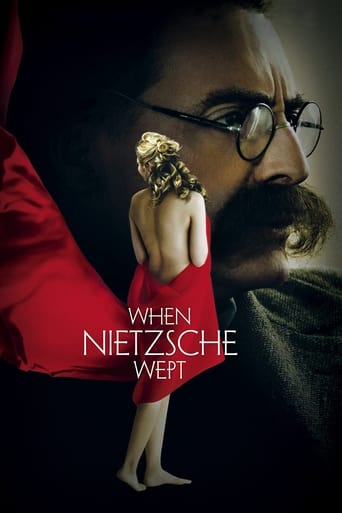When Nietzsche Wept (2007)
Viennese doctor Josef Bruer meets with philosopher Friedrich Nietzsche to help him deal with his despair.
Watch Trailer
Cast
Reviews
Great Film overall
Although it has its amusing moments, in eneral the plot does not convince.
Fun premise, good actors, bad writing. This film seemed to have potential at the beginning but it quickly devolves into a trite action film. Ultimately it's very boring.
It's simply great fun, a winsome film and an occasionally over-the-top luxury fantasy that never flags.
This is just plainly disgusting. No regard for actual facts about the protagonist and no mind paid to his ideas whatsoever. Some reviewers have opined, that the novel on which this movie is based was okay or even good. I haven't read it, so I take their word for it. I dearly hope that it isn't anything like this abominable piece of crap though. Acting and setting leave a lot to be wished for, establishing context seems to be a very alien concept to the makers of this film. I usually do not comment on movies, but this one really ticked me off. Why this was even made is quite beyond me. Stay clear, neither informative nor entertaining so save your time and energy for better causes. ;)
This movie is surreal. Literally, it has a lot of surrealistic scenes to mess with your mind, but also the whole presentation is surreal because there are so many bizarre angles. At its heart, it's a sober portrayal of depression and humanity's discontent (so you'd think it would be slow & heavy). But mostly it's humorous, at times as silly as the movie "Airplane!". It also features historical references, but you can't help feeling that the writer is being deliberately playful, distorting facts right before our eyes with a wink and a smile. In all, I think it's an entertaining experience, especially if you don't take it too seriously.It definitely has the qualities of a period piece romp, like maybe "Casanova" (2005), "Molière" (2007) or one of my faves, "Impromptu" (1991) about Chopin. But "When Neitzsche Wept" has a more subtle tone which prevents me from saying it's intended to be a comedy like the others I mentioned. Also, don't expect a biopic because it's not really about any particular man so much as it's about everyman's internal struggle between passion (freedom) and logic (duty).This film takes a somewhat light-hearted approach to a very dark subject, and I think that's what makes it unusual and clever. It's entertaining and digestible, but also there are a few powerful monologues delivered by Neitzsche (Armand Assante) that I had to rewind and hear again because they seemed to appear out of nowhere. Then suddenly we're back to a crazy scene of a redhead woman in diapers jumping around a crib. Don't worry, it all makes sense; it's just... surreal!
Contrary to what another reviewer asserted, I think the dream sequences only add to what would have otherwise been a well constructed, if by the numbers, film.I like fantastic visual elements in films, and here they contrast nicely with the realism of historical Vienna locations and period costumes.The script is not historical per se, but it does touch upon some historical realities such as the influence Nietzsche had upon Freud.I gave it 8 stars because a couple of the accents were atrocious, and in parts it seemed like the lighting and color correction were not as even as they could be.Nevertheless, I found this gem among the most watchable of the films that have landed in my que as of late.
I just wonder how many people are going to be tuned in to seeking out and sitting through a film all about psychoanalysis, detailing very briefly the more desperate incidences in the lives of some of the most brilliant minds ever to have graced Earth. My heart hopes as many as possible but my mind tells me not many will bother, and given this that's quite a shame. The film is a concentrated study on illness and the effects of illness but the said sickness is more affiliated to love or problems of a psychological kind. The events, no matter how fabricated over history, are still compelling and the film just about works as a drama or a study of an individual's actions given their emotions that run on a dizzying high.The film follows Josef Breuer (Cross) and Friedrich Nietzsche (Assante) who meet and attempt to help one another. The setting is 1870s Vienna in Austria at a time when some of the most brilliant minds ever would congregate to pioneer the study of psychoanalysis; love as an illness and what makes us who we are through these events. On this occasion, Nietzsche has fallen for a woman and she is Lou Salome (Winnick). This acts as the catalyst for him to seek help from Breuer, an experienced and responsible doctor who has battled his own demons in the past to do with one of his parents' early death. Nietzsche at first seeks to run from his problem, thinking escaping to Switzerland will compensate for the pain following the rejection of marriage.But this isn't the end of it. There is no surprise that a film dealing with psychoanalysis, and containing Sigmund Freud, has a few mind games up its sleeve. The film is uncannily seductive in its general atmosphere and quite humbling on other occasions. Breuer is good friends with Sigmund Freud himself (Elman) and they both seem overly concerned with Nietzsche which propels them into at least pretending one of them needs help from Nietzsche in return.In order to achieve this, Breuer assumes the stance that he himself is falling in love with one of his patients and requests the help from Nietzsche in return he help him get over his break up. There's a lot of psychology going on here and a lot of scenes and content that deals with mental health. Nietzsche undergoes perhaps the more interesting study of the characters because his is the more dramatic, slipping into despair and depression after initially trying to combat the break up with 'remedy' from prostitution and, like I mentioned, fleeing entirely.The point When Nietzsche Wept has going for it the whole time is the age of these primary characters. This is not a (another?) mere look at young people in contemporary America or wherever trying to get over relationships or trying to instigate one so that they may have sex, this is a thoughtful and interesting look at people of an older age dealing with real issues that at the time, remained as scary and as ambiguous as you could possibly imagine. The frightening thing that should remain at the back of the viewer's mind is 'what if you were very ill, but you did not know of the illness you have?' Twinned with this, what if you did not know of the treatment and the pain or whatever would simply not disappear? Nowadays, we're all fine with our doctors and so forth and our teen sex comedies that act as an escapist or humoured look at coming of age or love or sex or whatever but When Nietzsche Wept is a pit stop; a look back at times past.The film is a grand display of surrealism, dreams often beginning naturally enough before descending into chaos. We the audience ask the question of what is going on and just when it seems the impossible or the downright obscure is about to happen, our questions are answered. The film is a study into the great minds that pioneered certain theory but it's a look at their own struggles; their own struggles that helped shape an understanding in the first place. The film is a study of a delicate mentality as expressed by those of a brilliant natural intelligence.Whether it's the bizarre manner in which Breuer refers to Freud as 'Siggy' or the odd scenes to do with diegetic classical music complete with orchestra that Nietzsche himself composes to the bemusement of those around him, the film remains an interesting look at a subject that is being dealt with head on rather than in a metaphorical or dramatic way, much like Hitchcock and Lynch have done in the past. But don't be fooled for it isn't a documentary and it does retain a fair amount of drama throughout. It may not be as good a metaphorical study but it remains interesting and thought-provoking.





